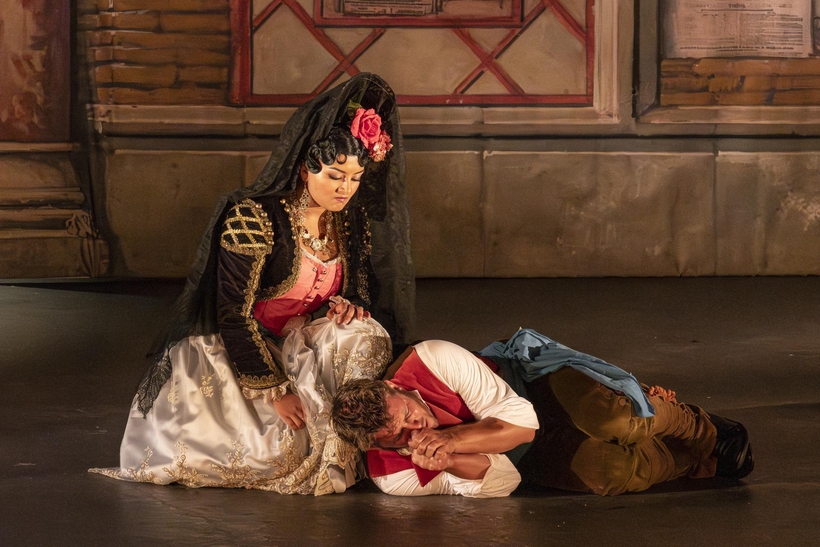Chances are you’re in the dark about the activities of Palazzetto Bru Zane—Centre de Musique Romantique Française. To decode the illustrious crosscurrents referenced in the institution’s name would require a monograph in itself. Headquartered at a Venetian palazzo dating back to 1695, it’s an intellectual beehive devoted to the study, performance, and promotion of “the French musical heritage of the long 19th century (1780–1920).” Opera is by no means the sole focus, but Bru Zane’s stylishly produced, academically impeccable recordings of forgotten lyric treasures are precipitating quite a renaissance. Luigi Cherubini’s Les Abencérages, anyone? Louise Bertin’s Fausto? Offenbach’s Le Voyage dans la Lune?

For nonspecialists, the logical gateway to the Bru Zane fairground would be a full-dress touring production of Georges Bizet’s Carmen, filmed live at the Opéra de Rouen Normandie on September 24, 2023. The scholarly agenda in the case of this perhaps overfamiliar title is a singularly seductive one. Here, per the publicity, is Bizet’s masterpiece as unveiled at the Opéra Comique in Paris in 1875, a few months before his early death at 36, to a response that disappointed him bitterly. To connoisseurs, that suggests—misleadingly, as it luckily turns out—spoken dialogue between musical numbers, as house style at the Opéra Comique dictated.
In fact, the revival’s raison d’être is to restore, as accurately as possible, Carmen’s historic look and stage traffic. Working from antique lithographs and production notes, the director Romain Gilbert and his production team transport us to a storybook world that is as exotic as it is nostalgic, brimming with theatrical life. The set designer Antoine Fontaine’s painted prospects of Seville, dominated by the looming block of the Giralda Tower, evoke hand-tinted vintage postcards. The picturesque finery of the city folk, the raffish garb of the smugglers, the bullfighters’ fancy dress, and the smart military uniforms are from the hand of Christian Lacroix, a couturier of art-historical inclinations with a rare appreciation of laces, beads, and specialty crafts.

Carmen, the free, fatalistic spirit who plays with fire, comes at us in the person of the petite Omani-born Canadian mezzo Deepa Johnny. Her looks might belong to a princess out of the Arabian Nights, and until tragedy strikes, her laser-focused, lustrous yet spicy tones project sheer joie de vivre—but then, in the crunch, she reveals real flint. In the French tenor Stanislas de Barbeyrac’s Don José, she has a sweet-faced, lost man-child whose struggle in the quicksands of possessiveness and jealousy will drag them both to their doom. In timbre and demeanor, the poised Romanian soprano Iulia Maria Dan lends José’s cast-off village sweetheart Micäela the radiant dignity of a woman who knows her worth.
The weak link in the cast is the French baritone Nicolas Courjal, whose bullfighter Escamillo cuts an incongruously ferrety figure and blusters through his music. But the British conductor Ben Glassberg gives even Courjal a boost, underscoring the Toreador Song with tight-sprung rhythmic dash and full-hearted instrumental solos that envelop and sweep a viewer along as the orchestra in an operatic video almost never does.
Carmen is available for streaming on OperaVision until October 1
Matthew Gurewitsch writes about opera and classical music for AIR MAIL. He lives in Hawaii
